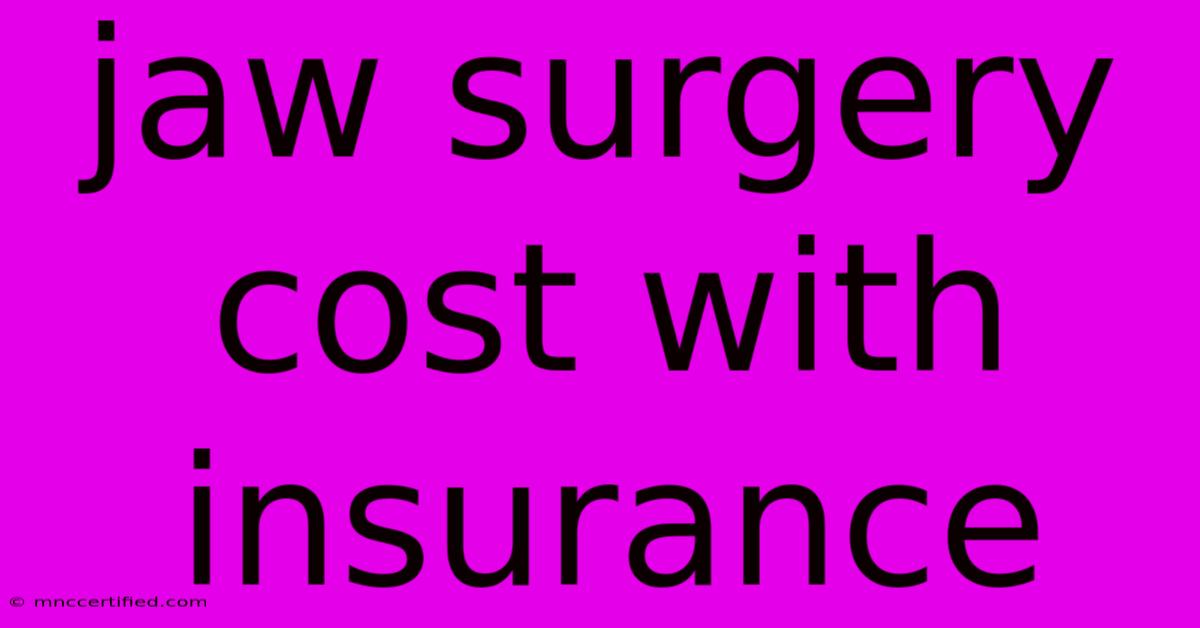Jaw Surgery Cost With Insurance

Table of Contents
Jaw Surgery Cost with Insurance: A Comprehensive Guide
Jaw surgery, also known as orthognathic surgery, can significantly improve facial aesthetics and functionality. However, the cost can be substantial. Understanding how insurance impacts the overall expense is crucial for anyone considering this procedure. This comprehensive guide breaks down the cost of jaw surgery, the role of insurance, and how to navigate the financial aspects effectively.
Understanding the Cost of Jaw Surgery
The cost of jaw surgery varies widely depending on several factors:
- Type of Surgery: Simple procedures like correcting a minor overbite might cost less than complex surgeries addressing multiple jaw misalignments. Bimaxillary surgery, which involves both the upper and lower jaws, is generally more expensive than single-jaw procedures.
- Surgeon's Fees: A surgeon's experience and reputation directly influence their fees. Highly experienced and renowned surgeons usually charge more.
- Anesthesia Fees: Anesthesiologist fees are separate and add to the overall cost.
- Hospital or Surgical Facility Fees: The choice of facility (hospital, ambulatory surgery center) impacts the overall cost.
- Diagnostic Tests and Imaging: Pre-surgical assessments, including X-rays, CT scans, and models, add to the expense.
- Post-Operative Care: Follow-up appointments, medications, and potential complications all contribute to the total cost.
- Geographic Location: Costs vary significantly based on geographic location; procedures in high-cost areas like major cities will generally be more expensive.
How Insurance Impacts Jaw Surgery Costs
Whether your insurance covers jaw surgery depends on several factors:
- Type of Insurance Plan: PPO plans generally offer broader coverage than HMOs. The extent of coverage depends on your specific policy.
- Medical Necessity: Insurance companies typically require proof that the surgery is medically necessary, not just for cosmetic reasons. This usually involves extensive documentation from your orthodontist and oral surgeon outlining the functional issues corrected by the surgery. Malocclusion (misalignment of teeth) causing difficulty chewing, speaking, or breathing, or impacting temporomandibular joint (TMJ) health, are typical reasons for coverage.
- Pre-Authorization: Most insurance companies require pre-authorization before the procedure. This involves submitting detailed information to your insurance provider for review and approval. Failure to obtain pre-authorization may result in significantly higher out-of-pocket costs.
- Deductibles and Co-pays: Even with insurance coverage, you'll likely have a deductible and co-pays to meet. These can be substantial, especially for major surgical procedures.
- Out-of-Network Providers: Using out-of-network surgeons generally leads to higher out-of-pocket expenses. Choosing an in-network provider is crucial for maximizing insurance benefits.
What to Expect:
- Negotiating with your insurance company: Be prepared to provide comprehensive documentation highlighting the medical necessity of your surgery. Work with your surgical team to ensure all necessary forms are completed accurately and efficiently.
- Understanding your policy: Thoroughly review your insurance policy to understand your coverage limits, deductibles, and co-pays.
- Estimating out-of-pocket costs: Work with your surgeon's office and insurance company to get a realistic estimate of your out-of-pocket expenses.
Minimizing the Cost of Jaw Surgery
Several strategies can help minimize the overall cost:
- Explore financing options: Many surgical centers offer financing plans or work with medical financing companies to provide payment options.
- Shop around for surgeons and facilities: Compare costs and services offered by different providers.
- Consider alternative treatment options: In some cases, less invasive treatments like orthodontics might be sufficient to address the underlying issues.
Conclusion
The cost of jaw surgery with insurance is a complex issue. By understanding the factors affecting the cost, your insurance coverage, and available strategies to minimize expenses, you can make an informed decision and navigate the financial aspects of this life-changing procedure more effectively. Always thoroughly review your insurance policy, communicate clearly with your surgeon and insurance provider, and explore all available financing options.

Thank you for visiting our website wich cover about Jaw Surgery Cost With Insurance. We hope the information provided has been useful to you. Feel free to contact us if you have any questions or need further assistance. See you next time and dont miss to bookmark.
Featured Posts
-
Springboks Thrive Erasmuss Low Pressure System
Nov 23, 2024
-
Loeffler For Agriculture Secretary Trumps Choice
Nov 23, 2024
-
Ogunlesi New Black Rock Board Member
Nov 23, 2024
-
Declassification Congresss Jfk Action
Nov 23, 2024
-
Argyle Holds On Gray Braces Save
Nov 23, 2024